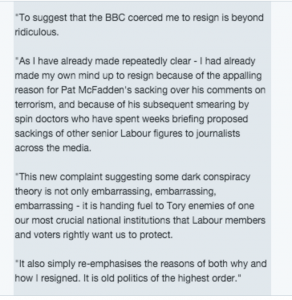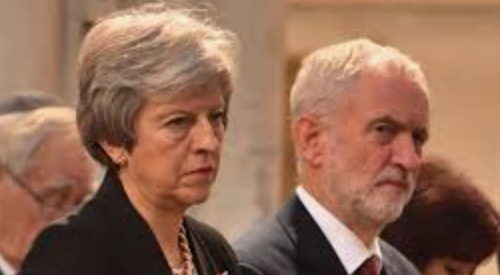There’s a sharp difference of opinion between Labour and the BBC over the latter’s coverage/management of Stephen Doughty’s resignation:
In a letter to Labour, Mr Gibb said he rejected the suggestion that we “orchestrated and stage-managed the resignation of Stephen Doughty”.
He said: “Your letter suggests that our decision to interview Mr Doughty in the run up to Prime Minister’s Questions was designed to ‘promote a particular political narrative’. This is simply not the case.”
“Again I do not accept, in any way, the programme has breached its duty of impartiality and independence,” he added.
Mr Doughty accused Mr Corbyn’s senior aides of “smearing” him and insisted he sent his resignation letter to the leader before appearing on TV.
There’s more on this story here, including discussion of that controversial deleted blog post describing the lead up to the live resignation:
Just before 9am we learned from Laura Kuenssberg, who comes on the programme every Wednesday ahead of PMQs, that she was speaking to one junior shadow minister who was considering resigning. I wonder, mused our presenter Andrew Neil, if they would consider doing it live on the show?
The question was put to Laura, who thought it was a great idea. Considering it a long shot we carried on the usual work of building the show, and continued speaking to Labour MPs who were confirming reports of a string of shadow ministers considering their positions.
Within the hour we heard that Laura had sealed the deal: the shadow foreign minister Stephen Doughty would resign live in the studio.
Here’s Doughty’s latest statement:
Although Labour is certainly making too much of a meal of this, I don’t quite go along with those scoffing that there was absolutely nothing noteworthy – or irritation-worthy – (from Labour’s point of view) about the way the news broke. And it’s interesting that Nick Robinson (certainly no Corbynista) has asserted that there is anti-Corbyn bias at the BBC.
Robinson’s complaint apparently led to a directive being issued to Radio 4’s comedy department:
After the Beeb’s former political editor Nick Robinson wrote to colleagues warning them against anti-Corbyn bias in the political coverage, the message was then picked up by the comedy department. Barry Humphries revealed this week that he was told he could not do a planned Corbyn joke on a BBC comedy show — unless he also did one about David Cameron.
We’re rather more used to hearing of Radio 4 comedy’s supposed left wing bias; stalwarts such as Mark Steel and Jeremy Hardy are decidedly to the left, and there are regular grumbles about the cosy left liberal consensus on shows such as The Now Show and The News Quiz. However a couple of recent programmes certainly demonstrate no pro-Corbyn bias.
Dead Ringers presented an end of the year edition set in the year 2020. One sketch presented a programme called ‘Who remembers the Labour Party’, presented by Caroline Aherne (from 13:40). To be fair, this sketch has several targets (we learn that George Osborne revealed his true lizard form in 2018) – and readers may like to go to 16:20 to find out who replaces Corbyn as Labour Party leader.
A bit sharper, perhaps, was the latest edition of the News Quiz. This opens with Francis Wheen (a signatory of the Euston Manifesto, incidentally) making fun of the Radio 4 injunction not to single out Corbyn for satire – ‘he’s not as other politicians – he’s the Messiah or something’. Susan Calman and Zoe Lyons are both very scathing about Emily Thornberry’s appointment as Defence Secretary (from 5:00). Miles Jupp summed up mercilessly:
It really was a thrilling couple of days as a large number of people understudying jobs they’re never going to actually do waited anxiously to find out if they were going to be asked to understudy different jobs that they’re never going to actually do … Corbyn promised a politics that would be more familiar to the lives of everyday working people and he has delivered. The Shadow Cabinet now reflects the lives of everyday Britons incredibly closely, forcing them to work in jobs they never wanted for a boss they openly hate.



